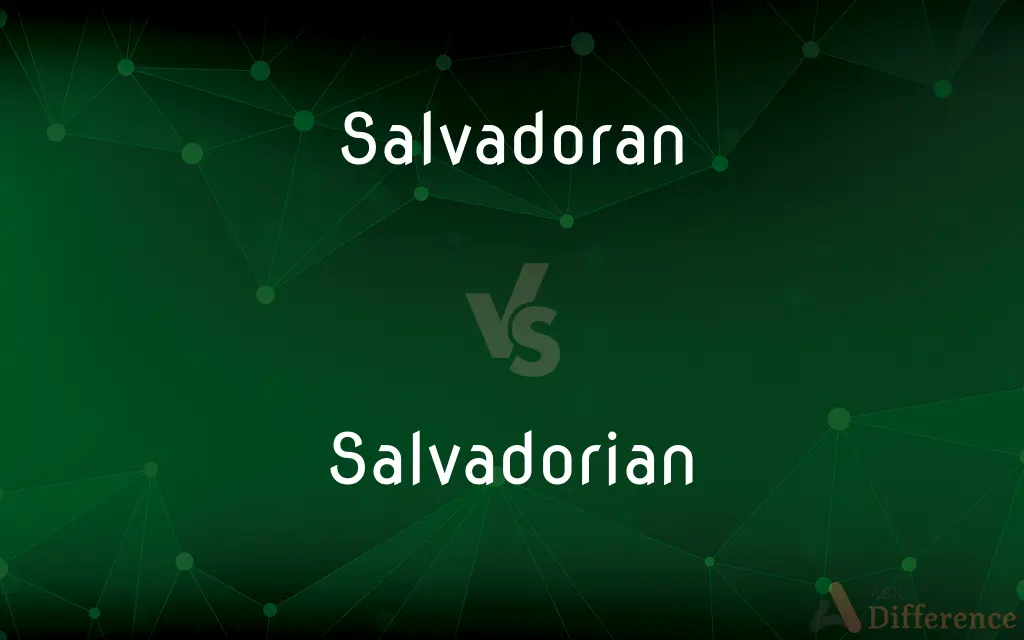Salvadoran vs. Salvadorian — What's the Difference?
By Tayyaba Rehman & Fiza Rafique — Updated on April 3, 2024
Salvadoran refers to something or someone from El Salvador, emphasizing nationality, while Salvadorian is an alternate form less used in formal contexts.

Difference Between Salvadoran and Salvadorian
Table of Contents
ADVERTISEMENT
Key Differences
Salvadoran is the more commonly used term to describe something or someone from El Salvador, especially in official contexts and among the inhabitants themselves. Whereas Salvadorian, although understood and sometimes used, is considered a less formal variant of the term.
Both terms are adjectives and nouns: as adjectives, they describe anything related to El Salvador, like Salvadoran cuisine or Salvadorian traditions. As nouns, they refer to the people of El Salvador. However, the use of "Salvadoran" is more prevalent in official documents and international affairs.
In terms of pronunciation, there's a subtle difference: "Salvadoran" is typically pronounced with a stronger emphasis on the last syllable, reflecting its Spanish origins. "Salvadorian" might sometimes be pronounced with a slightly softer tone, though this can vary based on regional accents and individual speaking habits.
Despite these differences, both terms serve the same purpose: to identify the nationality, culture, or origin associated with El Salvador. The choice between them does not imply any difference in status, quality, or respect, but rather personal or editorial preference.
Comparison Chart
Usage
More formally recognized and used.
Less formally used, more in casual contexts.
ADVERTISEMENT
Origin
Directly derived from "El Salvador."
Alternate English form, less directly connected.
Pronunciation
Emphasis on the last syllable.
Slightly softer tone, varies by speaker.
Formality
Preferred in official and formal texts.
Appears in casual or informal contexts.
Preference
Favored in official documents and international affairs.
Personal choice or regional usage influences its use.
Compare with Definitions
Salvadoran
Relating to El Salvador or its people.
The Salvadoran embassy hosted a cultural event.
Salvadorian
Indicative of Salvadorian traditions.
Salvadorian markets are full of vibrant colors and crafts.
Salvadoran
A native or citizen of El Salvador.
Salvadorans voted in their country's presidential election.
Salvadorian
Associated with Salvadorian heritage.
She teaches Salvadorian dance to children.
Salvadoran
Pertaining to the cuisine of El Salvador.
Salvadoran pupusas are a popular dish.
Salvadorian
An alternate term for someone from El Salvador.
Many Salvadorian families celebrate the Fiesta de las Flores.
Salvadoran
Reflecting the cultural practices of El Salvador.
Salvadoran music blends indigenous and Spanish influences.
Salvadorian
Referring to the cultural aspects of El Salvador.
Salvadorian literature is rich in folklore.
Salvadoran
The official language, Spanish, spoken in El Salvador.
She speaks fluent Salvadoran Spanish.
Salvadorian
Pertaining to Salvadorian cuisine.
He loves the taste of Salvadorian horchata.
Salvadoran
Of or relating to El Salvador or its people or culture.
Salvadorian
Of or relating to El Salvador or its people or culture.
Salvadoran
A native or inhabitant of El Salvador.
Salvadorian
A native or inhabitant of El Salvador.
Salvadoran
A native or inhabitant of El Salvador
Salvadorian
A native or inhabitant of El Salvador
Salvadoran
Of or relating to or characteristic of El Salvador or its people;
Salvadoran coffee
Salvadoran guerillas
Common Curiosities
Are Salvadoran and Salvadorian interchangeable?
Yes, they are interchangeable in most contexts, with a preference based on formality and personal choice.
Can someone be both Salvadoran and Salvadorian?
Yes, since both terms refer to the same nationality, someone can identify with either term based on personal preference.
Is Salvadorian a correct term?
Yes, Salvadorian is an alternate but less formally used term for someone or something from El Salvador.
What is Salvadoran cuisine?
Salvadoran cuisine is the traditional food of El Salvador, known for dishes like pupusas.
Why is Salvadoran more commonly used?
Salvadoran is more commonly used because it's preferred in official contexts and is recognized internationally.
What language do Salvadorans speak?
Salvadorans primarily speak Spanish, with variations unique to the region.
What does Salvadoran mean?
Salvadoran refers to anything related to El Salvador or its people.
Is there a cultural difference between Salvadoran and Salvadorian?
No, both terms refer to the culture and people of El Salvador without implying any cultural difference.
How important is family in Salvadoran society?
Family is a central part of Salvadoran society, with strong emphasis on familial ties and collective celebrations.
How do you pronounce Salvadoran?
Salvadoran is typically pronounced with emphasis on the last syllable, but pronunciation can vary.
Do Salvadorans prefer one term over the other?
Preference varies individually; however, "Salvadoran" is more widely used in formal contexts.
What are some traditional Salvadorian celebrations?
Traditional Salvadorian celebrations include the Fiesta de las Flores and the celebration of El Salvador's independence.
Are there different dialects of Spanish spoken in El Salvador?
Yes, while Spanish is the official language, there are regional dialects and variations spoken throughout El Salvador.
What is a typical Salvadorian dish?
A typical Salvadorian dish is horchata, a traditional beverage made from morro seeds.
What makes Salvadoran culture unique?
Salvadoran culture is unique for its blend of indigenous and Spanish influences, evident in its cuisine, music, and traditions.
Share Your Discovery

Previous Comparison
Dystaxia vs. Ataxia
Next Comparison
Date vs. DatedAuthor Spotlight
Written by
Tayyaba RehmanTayyaba Rehman is a distinguished writer, currently serving as a primary contributor to askdifference.com. As a researcher in semantics and etymology, Tayyaba's passion for the complexity of languages and their distinctions has found a perfect home on the platform. Tayyaba delves into the intricacies of language, distinguishing between commonly confused words and phrases, thereby providing clarity for readers worldwide.
Co-written by
Fiza RafiqueFiza Rafique is a skilled content writer at AskDifference.com, where she meticulously refines and enhances written pieces. Drawing from her vast editorial expertise, Fiza ensures clarity, accuracy, and precision in every article. Passionate about language, she continually seeks to elevate the quality of content for readers worldwide.















































